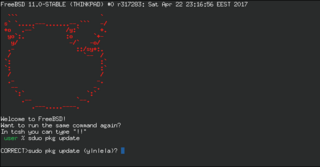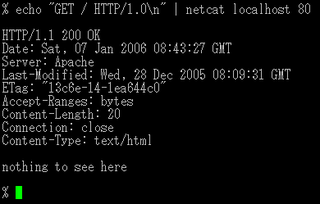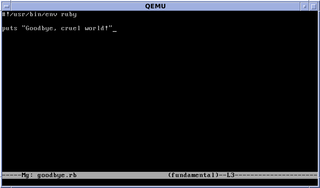
A Unix shell is a command-line interpreter or shell that provides a command line user interface for Unix-like operating systems. The shell is both an interactive command language and a scripting language, and is used by the operating system to control the execution of the system using shell scripts.

A man page is a form of software documentation usually found on a Unix or Unix-like operating system. Topics covered include computer programs, formal standards and conventions, and even abstract concepts. A user may invoke a man page by issuing the man command.

tcsh is a Unix shell based on and backward compatible with the C shell (csh).
In software development, Make is a build automation tool that builds executable programs and libraries from source code by reading files called makefiles which specify how to derive the target program. Though integrated development environments and language-specific compiler features can also be used to manage a build process, Make remains widely used, especially in Unix and Unix-like operating systems.

GoboLinux is a Linux distribution whose most prominent feature is a reorganization of the traditional Linux file system. Rather than following the Filesystem Hierarchy Standard like most Unix-like systems, each program in a GoboLinux system has its own subdirectory tree, where all of its files may be found. Thus, a program "Foo" has all of its specific files and libraries in /Programs/Foo, under the corresponding version of this program at hand. For example, the commonly known GCC compiler suite version 8.1.0, would reside under the directory /Programs/GCC/8.1.0.
The Filesystem Hierarchy Standard (FHS) is a reference describing the conventions used for the layout of Unix-like systems. It has been made popular by its use in Linux distributions, but it is used by other Unix-like systems as well. It is maintained by the Linux Foundation. The latest version is 3.0, released on 3 June 2015.
Info-ZIP is a set of open-source software to handle ZIP archives. It has been in circulation since 1989. It consists of 4 separately-installable packages: the Zip and UnZip command-line utilities; and WiZ and MacZip, which are graphical user interfaces for archiving programs in Microsoft Windows and classic Mac OS, respectively.
chroot is an operation on Unix and Unix-like operating systems that changes the apparent root directory for the current running process and its children. A program that is run in such a modified environment cannot name files outside the designated directory tree. The term "chroot" may refer to the chroot(2) system call or the chroot(8) wrapper program. The modified environment is called a chroot jail.
pax is an archiving utility available for various operating systems and defined since 1995. Rather than sort out the incompatible options that have crept up between tar and cpio, along with their implementations across various versions of Unix, the IEEE designed new archive utility pax that could support various archive formats with useful options from both archivers. The pax command is available on Unix and Unix-like operating systems and on IBM i, and Microsoft Windows NT until Windows 2000.

less is a terminal pager program on Unix, Windows, and Unix-like systems used to view the contents of a text file one screen at a time. It is similar to more, but has the extended capability of allowing both forward and backward navigation through the file. Unlike most Unix text editors/viewers, less does not need to read the entire file before starting, allowing for immediate viewing regardless of file size.

netcat is a computer networking utility for reading from and writing to network connections using TCP or UDP. The command is designed to be a dependable back-end that can be used directly or easily driven by other programs and scripts. At the same time, it is a feature-rich network debugging and investigation tool, since it can produce almost any kind of connection its user could need and has a number of built-in capabilities.

The file command is a standard program of Unix and Unix-like operating systems for recognizing the type of data contained in a computer file.
Unix-like operating systems identify a user by a value called a user identifier, often abbreviated to user ID or UID. The UID, along with the group identifier (GID) and other access control criteria, is used to determine which system resources a user can access. The password file maps textual user names to UIDs. UIDs are stored in the inodes of the Unix file system, running processes, tar archives, and the now-obsolete Network Information Service. In POSIX-compliant environments, the shell command id gives the current user's UID, as well as more information such as the user name, primary user group and group identifier (GID).

JOE or Joe's Own Editor is an ncurses-based text editor for Unix systems, available under the GPL. It is designed to be easy to use.

mg, originally called MicroGnuEmacs, is a public-domain text editor that runs on Unix-like operating systems. It is based on MicroEMACS, but intended to more closely resemble GNU Emacs while still maintaining a small memory footprint and fast speed. An expanded version of the original is included as part of OpenBSD, where it is maintained, and snapshots of the OpenBSD version are available in the native package management trees of many other systems, including MacPorts, FreeBSD Ports, pkgsrc and Debian.

cowsay is a program that generates ASCII art pictures of a cow with a message. It can also generate pictures using pre-made images of other animals, such as Tux the Penguin, the Linux mascot. It is written in Perl. There is also a related program called cowthink, with cows with thought bubbles rather than speech bubbles. .cow files for cowsay exist which are able to produce different variants of "cows", with different kinds of "eyes", and so forth. It is sometimes used on IRC, desktop screenshots, and in software documentation. It is more or less a joke within hacker culture, but has been around long enough that its use is rather widespread. In 2007, it was highlighted as a Debian package of the day.

Unix is a family of multitasking, multi-user computer operating systems that derive from the original AT&T Unix, whose development started in 1969 at the Bell Labs research center by Ken Thompson, Dennis Ritchie, and others.
The following outline is provided as an overview of and topical guide to the Perl programming language:
doas is a program to execute commands as another user. The system administrator can configure it to give specified users privileges to execute specified commands. It is free and open-source under the ISC license and available in Unix and Unix-like operating systems.










